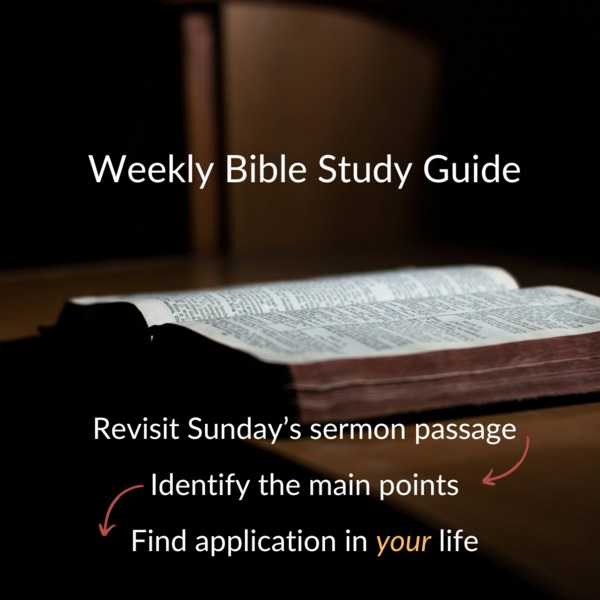|
|

|
How to use the Bible Study Guide:
1. Pray. Ask the Lord to open your eyes, that you might behold wondrous things out of his Law (Ps. 119:18). 2. Read Sunday's passage. Feel free to read it more than once, or in another translation. 3. Review the sermon outline. Try to see how the points came out of the text. 4. Answer the questions below. Focus on personal application. 5. Pray. Praise and thank the Lord, then ask him to work in mighty ways.
Remember, we live not by bread alone, but by every word which proceeds from the mouth of God (Dt. 8:3; Mt. 4:4). |

|
The Passage: Romans 15:1–13 ESV
1 We who are strong have an obligation to bear with the failings of the weak, and not to please ourselves. 2 Let each of us please his neighbor for his good, to build him up. 3 For Christ did not please himself, but as it is written, “The reproaches of those who reproached you fell on me.” 4 For whatever was written in former days was written for our instruction, that through endurance and through the encouragement of the Scriptures we might have hope. 5 May the God of endurance and encouragement grant you to live in such harmony with one another, in accord with Christ Jesus, 6 that together you may with one voice glorify the God and Father of our Lord Jesus Christ. 7 Therefore welcome one another as Christ has welcomed you, for the glory of God. 8 For I tell you that Christ became a servant to the circumcised to show God’s truthfulness, in order to confirm the promises given to the patriarchs, 9 and in order that the Gentiles might glorify God for his mercy. As it is written, “Therefore I will praise you among the Gentiles, and sing to your name.” 10 And again it is said, “Rejoice, O Gentiles, with his people.” 11 And again, “Praise the Lord, all you Gentiles, and let all the peoples extol him.” 12 And again Isaiah says, “The root of Jesse will come, even he who arises to rule the Gentiles; in him will the Gentiles hope.” 13 May the God of hope fill you with all joy and peace in believing, so that by the power of the Holy Spirit you may abound in hope. |

|
"With One Voice" Sermon Outline
Intro: This past Sunday was our annual Internation Sunday celebration. We celebrated the fact that God has brought us together from many nations into the one body of Christ, the church. This is a beautiful and biblical gift, but it can come with challenges. Nearly 2,000 years ago, Paul wrote to a group of ethnically diverse churches who were dealing with divisive attitudes based on cultural preferences. He writes this passage to plead with them for unity, reveal the ultimate purpose of unity, and remind them that it was always God's plan to have unity across ethinic lines. I. The Plea for Unity (v. 1–3). To have unity, those who are strong in their faith should bear with those who are weak, and be willing to please others instead of themselves. This countercultural instruction points us to Christ, who willingly bore the reproach of others to save us. Do you bear with those whose faith is not as mature as yours? Do you always insist on getting your way in church, or do you put others' needs before your own? Being willing to give up your preferences for the sake of unifying the church and building up the body is a sign of spiritual strength, not weakness. II. The Purpose of Unity (v.4–7). Being united is ultimately for the purpose of glorifying God together with one voice. God's people will glorify him in complete unity, so efforts to foster unity now are God-honoring. III. The Plan for Unity (v. 8–13). Paul cites a string of Old Testament passages to show that it was always God's plan to unite Jew & Gentile in Christ. Now this unity is possible in the church! Conclusion: Paul's explanation of his plea for unity, the purpose of unity, and God's plan for unity show us that unity is not to be taken for granted; it was purchased with the precious blood of Christ, and is the gift of God's grace. It is not to be taken for granted or squandered, but cherished, strengthened, and preserved. We must decide today that we will welcome one another as Christ has welcomed us, for the glory of God. |

|
Questions
1. The Plea for Unity. - Paul says the “strong” have an obligation to bear with the “weak.” Who is "strong" and who is "weak?" - What does “bearing with” look like in real church life today? - What kinds of disagreements in church might fall under Paul’s category of “pleasing our neighbor for their good?" - How does Christ’s refusal to please Himself shape the way we approach conflict or difference in the church?
2. The Purpose of Unity. - How does scripture encourage or instruct you? - What will it take to bring the many voices into "one voice?" - What is holding this back in our own church context? - What would it look like to welcome one another as Christ has welomed us?
3. The Plan for Unity. - Go back and read the Old Testament passages he has cited. What stands out? - Why does God want a unified people? - How do the various peoples become one? - What is the connection between these Old Testament passages, and Paul's repeated use of the term "hope," including his deliberate prayer for the churches' to hope? - What can you do to foster unity in the church? |

|
Prayer
1. Praise God for his plan to unite us from many backgrounds into the one body of Christ. 2. Thank Jesus for making our unity possible by taking our sin upon the cross. 3. Ask God to help you glorify him, and to do so in unity with those with whom you disagree. 4. Ask for help to preseve the unity of the church. |

|
Thanks
Thanks for reading the Bible Study Guide! I pray it helps us "continue to grow up in every way into him who is the head, into Christ" (Eph. 4:15).
Sincerely, your brother in Christ, Tom Hansen, Senior Pastor |
